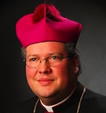
Prime Bishop Anthony Mikovsky
Lent
- February 26, 2024
- , 6:08 pm
- , Prime Bishop Blog
As I write this article, we find ourselves at the beginning of the season of Great Lent. Because of the calendar calculations this year, the celebration of Easter is rather quite early, March 31, 2024. In fact, it is somewhat rare that Easter occurs in March, but it is bound up with the coming of Spring and the phases of the moon. Easter occurs on the Sunday following the full moon following the Spring equinox, which is March 21. Therefore, Easter can be any day from March 22 to April 25. And of course, once the date of Easter is calculated we merely count backwards for the weeks of the Lenten season.
Some have questioned whether this is a good idea and maybe things would be better, or at least easier, if the celebration was just some fixed week during the year, but, after some consideration I think that this would certainly lose something of what is occurring. That said one of the things that would remain the same is the fact that our Lenten season begins at the end of winter or in the early spring when the weather is still a bit cold (at least in the northern areas).
As we begin the Lenten season, the nights are long and sometimes bitter cold. It reminds us that often our moral and spiritual lives are darker and colder than they should be. We need light and warmth to come and take us over. But first we must confront the dark and cold. It is within our Lenten practices and devotions that we accomplish this. It began with our planning that was done during the season of Pre-Lent. It was there that we examined our spiritual situation and in the final days of decision before Ash Wednesday, set ahead of us a course for our Lenten journey. On Ash Wednesday we acknowledged that we are sinners in need of the healing and comforting presence of God and throughout the season we strive to more fully embrace the passion and death of Jesus in our Lenten practices.
Fasting and abstinence are not the easiest of practices and yet they are vital to our spiritual awareness. The recent pamphlet of the P.N.C.C. on Fasting says: “Fasting and prayer can improve our relationship with God. Fasting can remind us of our dependence on God and it is a way to humble ourselves before God (Psalm 35:13). It is a spiritual discipline of denying ourselves food to feast on the things of God. Fasting is an important way to demonstrate to God as well as to ourselves that we are serious about our relationship to Him.”
I must say that for myself, the practice of fasting and abstinence is not mostly an act of self-denial, although I suppose it is that as well. Because I certainly do enjoy fish, even canned tuna fish, the giving up of meat in Lent is not a huge sacrifice. As is traditional, during the season I abstain from meat on Wednesdays and Fridays and I strive to give up sweets on these days as well. What this does is make my eating a little more intentional. And therefore, it makes my daily living a little more intentional. It is in this way, as the pamphlet says, it can “remind us of our dependence on God and a way to humble ourselves.”
The season of Great Lent is also a time of increased prayer, but again this prayer should be directed to help us join with the passion and death of Jesus. I strive to pray the Liturgy of the Hours each day. Sometimes I do this in the chapel at the National Church Center, other times while at home, but I also must admit that sometimes daily living gets in the way. Each Lent I renew these efforts to be a bit more intentional about my prayer life. Maybe I get up a little earlier to have a few extra moments for prayer. Maybe put aside some time every evening to turn to God in prayer. During Lent, our lives must also be lived in a little more intentional way because we must plan to attend Stations of the Cross or Bitter Lamentations in our own parishes. These devotions are especially important as they bring us into connection with the passion and death of our Lord. Before Lent begins, I immediately mark the times of these devotions in my calendar and do not allow other items to intrude on them. Since Bitter Lamentations is not celebrated here at the Cathedral in Scranton, I also put aside time on Friday afternoons to sing this devotion myself. This reminds us that even if we cannot, for some legitimate reason, attend Lenten devotions in our parish church, we can still celebrate these devotions as they are found in the P.N.C.C. Prayerbook.
We must also be more intentional in this season of Great Lent to our penitential practices. We certainly have the opportunity to receive the Sacrament of Penance each and every time Holy Mass is celebrated, but the season of Great Lent allows us to focus our attention on this Sacrament in a little greater and intentional way. Certainly, this can begin by attending a Lenten Retreat or Penitential Devotion, but it can also mean taking a little extra time in preparation before receiving the Sacrament of Penance when we are at Mass. The P.N.C.C. has given us several different reflections to allow us to prepare for Penance. There are Examinations of Conscience at the beginning of the Mass Book at Church and there are others in the P.N.C.C. Prayerbook. It is also a good practice to just spend some time in prayer before Mass seeking the forgiveness of Almighty God knowing that our Lord Jesus Christ went to the Cross to extend salvation to us and grant us His mercy.
As a final thought I want to return to the situation mentioned above about the determination of the celebration of Easter, and therefore the season of Great Lent being tied to nature around us. This practice allows us to stay in connection to the celebration of Passover in the Old Testament. It is a part of the realization that the entire life of our Lord and Savior Jesus Christ is the culmination of a plan from the foundation of the world to save us.
Our intentional way of living together with nature during this season is very important. We know that our Lord and Savior Jesus Christ became fully human in the Incarnation. He became human so that we could unite ourselves with what is divine. But we do not do this by shunning all of the things of this world, but rather we strive to put them in their right place so that the things of this world can help us to unite ourselves with Jesus Christ. As I said above we live in an intentional way and the intention is to use whatever we are doing, whatever is around us, to grow closer to Christ, especially in this season of His saving passion and death.
My brothers and sisters, let us adopt the practices of the season of Great Lent in an intentional way. Consider the world around us. It grows from cold to warmer, and dark to lighter. Let us allow our practices of fasting and abstinence, our increased prayers, our increased giving and our attention to Lenten devotions to unite our spiritual life to this reality. Let our cold hearts become warm, let our lives darkened by sin become lightened by the presence of Jesus Christ, the light of the world. Let us be intentional in Lent, that we may rejoice fully at Easter.

